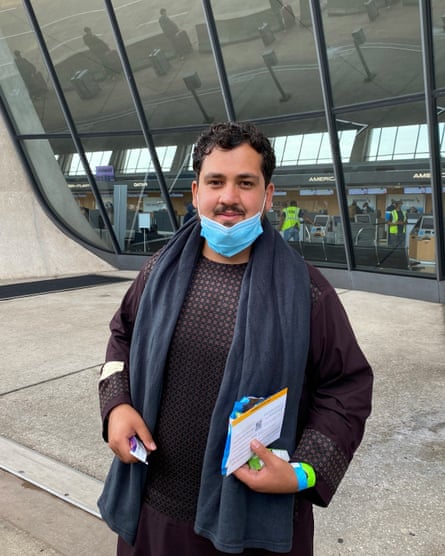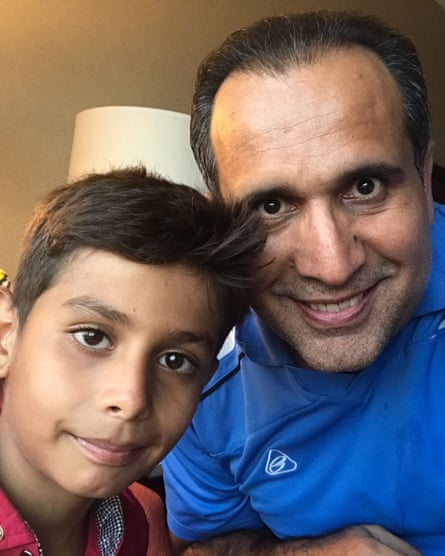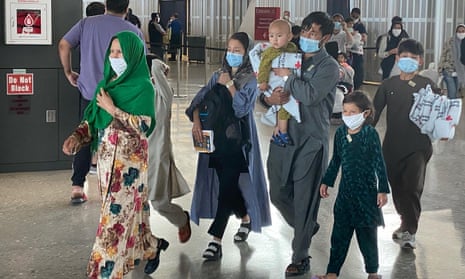As he stepped outside the sliding doors at Virginia’s Dulles airport last Wednesday, Abdul Waris allowed himself a moment to smile in relief. It was his first time in the United States, and just days earlier he was at the Hamid Karzai international airport in Kabul, Afghanistan, desperately trying to get out of the country.
“It was very difficult,” he said. “But I’m happy to come here, because over there the situation is very bad.”
According to the White House, more than 110,000 people have been evacuated from Afghanistan by the US since 14 August, the day before the Taliban took control of Kabul amid a government collapse and the drawdown of a 20-year US military presence.
Many of the new arrivals, like Waris, are part of the Special Immigrant Visa program for Afghans (SIV) who were at risk of reprisal under Taliban rule because they worked with the US during the war.

The stream of refugees through Dulles, situated roughly 25 miles from downtown Washington DC, was constant. The state department declined to provide the Guardian with specific details of evacuee movements, but many at the airport said that before arriving in the US, they had left Kabul on US military flights to Qatar and were then flown to Germany.
Returning US citizens and green card holders can leave on their own accord after testing for Covid-19, but refugees are being taken to the nearby Dulles Expo Center and then army bases across the country for further processing.
With most of these steps taking days or more, it will be a while still before new arrivals will be able to settle into homes of their own and start their lives in America. Still, many cannot believe they’re here at all.
“There were dangerous moments at Kabul airport because the Taliban surrounded the airport. They were fighting with the people ... I spent two whole nights in front of the gates,” said 21-year-old Abidullah Sarwan before getting on a bus to Fort Lee in southern Virginia.
“People died and fainted due to the crowd and heat,” he said. “I’m extremely delighted [to be here] ... I’m safe.”

But amid the bureaucracy, Afghans already in the US have found it difficult to confirm their loved ones have arrived. In the Expo Center parking lot, two Afghan American men sat on a curb, hoping to see their newly arrived relatives. But the building is strictly guarded by officials and military personnel, and no visitors are allowed inside.
“I just came here to hope to see my wife. Her flight has landed, but I don’t even know if she’s inside or in the airport,” said 31-year-old Samir Vosoq.
Vosoq flew to Virginia from Atlanta, planning to travel home with his wife, whose US visa has been in process for years. But as he sat outside the Expo Center, he realized his wait was not yet over. “They said nobody can see them ... and escorted us away from the property,” he said. “From here they’re going to send her to Texas or Wisconsin.”
His friend, who wanted to remain anonymous, stood over makeshift luggage, wrapped in garbage bags. His relatives were inside, and he had managed to persuade officials to let him take some of their belongings and send in some new ones.
“Since they left home they are in the same clothes. So we passed them some clothes and supplies, and took some just to make them light.”
But that’s pretty much all he could do. The process “is something like a secret”, he said. “They’re still waiting on their papers ... I don’t know when we’re gonna get an answer, so we just have to go home and wait.”
For many Afghan-Americans watching the arrivals from afar, the past few weeks have been a painful reminder of what they have endured so many times before.
“It’s a living nightmare ... It’s like reliving my devastating past,” said Sam, a businessman in the DC area who fled his homeland in 1986 during the Afghan-Soviet war, in a phone interview.
“I was a refugee just like all those people,” he said. “I walked from Afghanistan ... through minefields as a teenager to make it to Pakistan in one piece. My cousin was blown up in the process.”
Over the past 20 years, Sam, who asked to use only his first name, spent significant time in Afghanistan working as a subcontractor on US government infrastructure projects, employing thousands of Afghan workers. He’s now scrambling to bring those still in the country to the US through the SIV program.
In the past few weeks he’s sponsored more than 100 people under the program, but only one has made it so far.
“It’s a hurry up and wait scenario. No matter how fast we do it, it’s up to the US government processing the information,” he said.
“I went through the process myself and now I see my people again in a desperate situation that breaks my heart. As a world superpower, I cannot comprehend how we’ve left the country in the hands of the Taliban.”
Back at Dulles arrival hall, the anxiety was palpable for Bahaudin Mujtaba, who was hoping to reunite with his 10-year-old son, Noman. Mujtaba, a US citizen, has lived in Florida since 1984. He adopted Noman in 2018, but was still in the process of getting him to the US when the government fell last month.

With the help of the adoption agency, they were able to expedite Noman’s departure and get him on an evacuation flight. But it was far from easy. “The first day they were stopped. They could not get past the Taliban checkpoints. Luckily they were able to get into the airport on the second day ... It was an enormous relief just for them to get past the gates.”
As Mujtaba waited, chilling news arrived from the airport his son departed from just days earlier – a deadly Islamic State bombing had ripped through it, killing 170 people.
People who have just arrived from Kabul continued to walk past Mujtaba and out of the Dulles arrival hall, unaware of their narrow escape.
“My son passed through that area twice and waited 23 hours there the first day. We were very lucky.”
